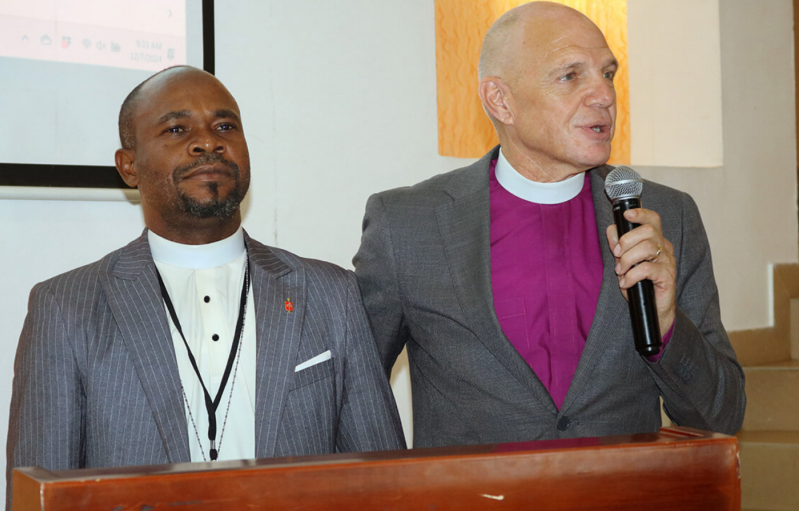
The United Methodist Church in Nigeria has taken steps to forge forward and put behind the acrimonious division that saw some leaders and members of the church create a splinter group. Bishop Ande Emmanuel, who was elected as the Bishop of the West Africa Central Conference in December 2024, said that he is committed to resolving the challenges that led to the departure of former leaders who went on to form the Global Methodist Church of Nigeria.
Bishop Emmanuel said he had held 25 listening and consultative meetings across the five annual conferences with a view of uniting all United Methodists in Nigeria.
“The purpose of these sessions is to seek unity and hear members’ concerns and how they want us to move forward,” said Bishop Emmanuel, adding that the church “remains steadfast and thriving, even in the face of challenges.”
United Methodist Church in Nigeria General Secretary, Rev. Dr Eunice Musa Iliya told CDI in an interview that UMCN has gone “through a lot of challenges for over 23 years due to leadership and power tussles.”
Rev Iliya traced the split of the church to a decision made by former UMCN Bishop Johnwesley Yohanna who controversially resigned months to his retirement in August 2024. Rev Yohanna, and some former leaders of UMCN, had applied and successfully changed the registered name of UMCN to Global Methodist Church in Nigeria, said Rev Iliya.
“The saddest aspect of the exit was former Bishop Yohanna and his loyalists’ decision to transfer all the UMCN properties to GMC after the illegal change of name without the consent of the church. They left with UMCN money, all staff and pastors pension including all UMCN bank accounts and the UMCN headquarters in Mile Six Jalingo. They also changed the sign boards to Global Methodist Church,” explained Rev Iliya.
She also responded to accusations made against UMC about its support for LGBTQ+ community and acceptance of same-sex marriage terming the allegations as “misinformation”
“We want to state categorically clear that the UMCN is evangelical in its doctrine and does not accept, approve nor endorse homosexuality. The UMCN believes that marriage is exclusively between a man and a woman as stipulated in the Nigerian constitution, theology and culture,” said Rev. Iliya.
Referencing the 2024 United Methodist Church Conference in Charlotte, North Carolina, Rev. Iliya clarified that each region within the United Methodist Church was granted “autonomy to contextualize its theology, policies and administration based on the law of the land, culture and theology.”
The Charlotte Conference threatened to split the Methodist Church after members overwhelmingly voted to lift the ban on ordaining LGBTQ+ clergy and the blessing of same-sex couples. Hundreds of Methodist churches across the globe disagreed with the decision and moved to sever ties with the United Methodist Church.
On Dec. 17, 2024, The United Methodist Church moved to court seeking to have the name change nullified and the assets, properties and accounts returned to UMCN. The first hearing of the court case is set for Mar. 3, 2025.
As the court process starts, Bishop Emmanuel said the focus will be to unify the church, reconciliation and capacity development to cement the church role as a beacon of hope and “a source of transformation in our nation.”
“I urge all members to remain steadfast and not be distracted by those who attempt to embark on the impossible mission of destroying the church in Nigeria,” said Bishop Emmanuel.
In a statement, the Global Methodist Church Nigeria said it did not want to comment on the legal dispute because of the “potential for misinterpretation or misunderstanding.”
Bishop John Schol, who had stepped in briefly for three months before the election of Bishop Emmanuel, said that instead of focusing on the lawsuit, UMC Nigeria had chosen to move together “with holy and bold plans to honor Jesus Christ and advance God’s mission and ministry through the United Methodist Church.”
Schol underscored Nigeria’s crucial role in the spread of the gospel as the sixth most populated nation in the world. He acknowledged the reunification of a group called the Southern Conference of The United Methodist Church that had separated itself from the denomination for a decade due to differences with Bishop Yohanna.
“The unification is a time of renewal and opportunity for greater evangelism and mission. UMC Nigeria will unify United Methodists around a common mission that develops spiritual and transformation leaders, making disciples, growing congregations and transforming the world,” Bishop Schol told United Methodist news outlet.
The United Methodist Church in Nigeria now has five regional bodies which are referred to as conferences: Southern Nigeria, Central Nigeria, Northeast Nigeria, Northern Nigeria and the Southern Conference. UMC Nigeria together with the Liberia, Sierra Leone and Cote d’Ivoire Episcopal areas make up the West Africa Central Conferences.





